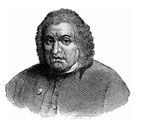
The Religion of Dr. Johnson
LETTERS FROM ENGLAND
It is one of the myths of modernity that the truly great intellectuals of history must have been skeptics. In England this utterly fallacious mythology is much more difficult to maintain than in America, where history is so easily swallowed up in progress and change. Example: My barrister’s chambers and London flat are situated just five minutes from Samuel Johnson’s Gough Square house, where he produced his Dictionary and The Rambler, down the Strand is a statue of Johnson, so prominently placed as to be unavoidable, right behind St. Clement Danes — Johnson’s favorite church; and when I frequent the historic Cheshire Cheese chop house off Fleet Street, I see the chair Johnson sat in while regaling the likes of Sir Joshua Reynolds and displaying skills that made him unquestionably the greatest conversationalist and raconteur of all time. And what was the religious position of this 18th-century intellectual, living smack in the center of the so-called Age of Reason?
Biographer Peter Quennell, in his Samuel Johnson: His Friends and Enemies, leaves no room for ambiguity: “Johnson…admitted no compromise, but asserted the unshakable truth of every major point of Christian doctrine.”
That this is no exaggeration can be seen both from the intimate details of Johnson’s spiritual life and from his numerous conversational declarations on religion. As a student at Oxford, he was deeply touched by William Law’s Serious Call to a Holy Life; Johnson himself would later compose an informal diary of prayers (published only posthumously). These Prayers and Meditations show us that Johnson placed all aspects of his existence sub specie aeternitatis. On beginning the second volume of his Dictionary, he prayed: “O God, Who hast hitherto supported me, enable me to proceed in this labour, and in the whole task of my present state; that when I shall render up at the last day an account of the talent committed to me, I may receive pardon for the sake of Jesus Christ.” When he began The Rambler, he prayed: “Grant, I beseech Thee, that in this my undertaking, Thy Holy Spirit may not be withheld from me, but that I may promote Thy glory, and the salvation both of myself and others.”
You May Also Enjoy
What do most of us know of Romania? Practically nothing. The best known “Romanian” (he…
The test of moral living and acceptance before God has never been intelligence or social standing. Quite the contrary.
Science and Christian faith agree that the universe has overall structure but an open future, and prayer is a prime factor in fine-tuning that future.

